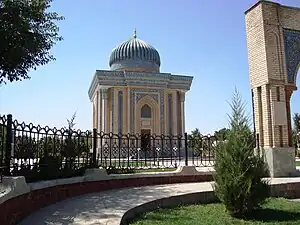Abdul Bari Firangi Mahli | |
|---|---|
| Personal | |
| Born | 1878 |
| Died | 1926 |
| Religion | Islam |
Abdul Bari Firangi Mahali (1878–1926) was an Indian Muslim scholar and writer from the Firangi Mahal palace in Lucknow.[1] He authored 111 books.[1]
History
His descendants moved from Sihali, Barabanki to the Firangi Mahal around 1692.[1] In 1915, he was residing in Lucknow.
Politics
During the First World War he asked the Sultan of Turkey to support Britain or remain out of the war.[2]
On 26 January 1919 he presided over a protest meeting in Lucknow against the British attitude against Muslims.[3][4]
He was highly active in the Khilafat movement.[1]
He preached Hindu-Muslim unity, especially during the Khilafat agitation, and was an associate of Mahatma Gandhi. On other occasions, he urged Muslims not to sacrifice cows in respect of the Hindus.[5]
Institutions
- In his opposition to Western education, he founded Madarssa-i-Nizamia in Lucknow.
- He set up Anjuman-i-Khuddam-i-Kabba (1914) to prevent desecration of Muslim Holy places by the British.
- He was the founder member of Darul Mussannefin Shibli Academy, (1915–1916).[6]
- He was the founder member of Jamia Millia Islamia in United Provinces, India (1920).[7]
See also
References
- 1 2 3 4 "Cam Diary: Lucknow's Farangi Mahal". Daily Times (newspaper). Archived from the original on 22 April 2007. Retrieved 22 August 2019.
- ↑ Gandhi's Rise to Power: Indian Politics 1915–1922 By Judith M. Brown
- ↑ Jafariya News, 21 November 2004 Archived 6 April 2010 at the Wayback Machine
- ↑ The historic perspective of Inhidaam-e-Jannatul Baqee & Jannatul Mualla Archived 12 April 2010 at the Wayback Machine
- ↑ September 1923. Francis Robinson, Separatism Among Indian Muslims, Delhi, 1975, p. 339.
- ↑ Darul Musannefin Shibli Academy Retrieved 22 August 2019
- ↑ "Jamia Millia Islamia, A Historical Note". Archived from the original on 30 June 2007. Retrieved 22 August 2019.
External links
Authority control databases | |
|---|---|
| International | |
| National | |
| Maturidi scholars |
|  | ||||||||||||||||||||||||
|---|---|---|---|---|---|---|---|---|---|---|---|---|---|---|---|---|---|---|---|---|---|---|---|---|---|---|
| Theology books | ||||||||||||||||||||||||||
| See also | ||||||||||||||||||||||||||
Maturidi-related templates
| ||||||||||||||||||||||||||
This article is issued from Wikipedia. The text is licensed under Creative Commons - Attribution - Sharealike. Additional terms may apply for the media files.